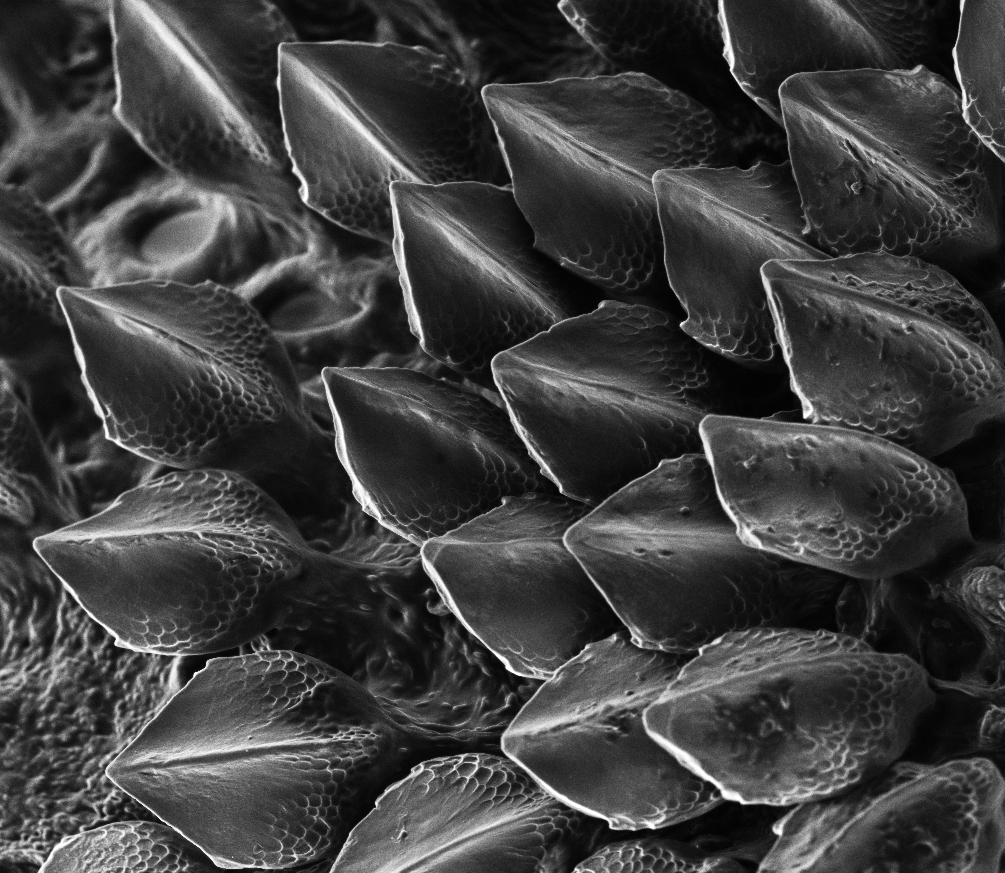
UF Biologist Receives NSF Grant to Investigate Shark ‘Skin Teeth’
Nature’s ingenuity inspires new pathways for design
Most of us never get close enough to sharks to touch them – let alone examine their skin. One University of Florida professor, meanwhile, intimately studies the tiny ridged patterns on each individual V-shaped scale. He believes these distinctive tooth-shaped plaques may hold the key to improved fluid dynamic design.
Biology professor Gareth Fraser, PhD, will lead a research team on a multi-disciplinary National Science Foundation (NSF) grant to explore the tooth-like scales found on shark skin, called dermal denticles. Made of dentine and enamel, denticles have evolved over millions of years to provide a tough external armor and augment sharks’ momentum. Small grooves on the denticles encourage water to flow efficiently, reducing drag in the water. Sharks have positioned themselves as the ocean’s apex predator, moving swiftly through their aquatic homes like torpedoes when hunting – thanks to this specialized feature of their skin.

Fraser’s three-year project will investigate how denticles’ distinctive attributes could inspire new designs for an array of applications, even for new surfaces of cars and airplanes to improve drag reduction.
Shark denticles demonstrate great diversity in shape and pattern — but scientists currently know relatively little about denticle evolution and the impact of their form and pattern on shark speed. “Even within a few millimeters on a single shark, the denticle shape changes from flat leaf-like structures to these magnificent three-pronged shapes,” Fraser said.
Fraser and his team plan to print 3D models of the denticles to replicate them on a detailed, micron-scale. The researchers will combine 3D printing, engineering methods and RNA sequencing to identify the most efficient denticle design and apply the findings to surface structure design. “On an engineering level, if you can augment a surface to improve function and efficiency, that is significant,” Fraser said.
Innovative solutions to reducing drag in cars, airplanes or turbines, Fraser said, will encourage less fuel use, ultimately reducing pollution in the atmosphere. “We aren’t directly working on climate change or reducing CO2 in this grant, but the wider implications of our integrative work include these broader objectives,” Fraser said.

The framework of the project fuses three sciences: paleontology, engineering and developmental biology. Fraser said, “We integrated every one of those aims from deep time, and development to design; it all works together.” As the principal investigator for the grant, Fraser will collaborate with Harvard University professor George Lauder, PhD, and Yale University fellow Elizabeth Sibert, PhD.
The grant will offer specialized training for undergraduate students with disabilities through a Research Experiences for Undergraduates (REU) program. NSF has funded the REU for two years, but Fraser hopes to develop it into a significant program long-term. “We were thinking about how laboratory science hasn’t been easily accessible to diverse students,” Fraser said. “There’s a real need to allow all students the opportunity to sample this type of integrated research.”
As a developmental biologist, Fraser never expected to print shark denticles to expand on their real-world application. “We hope that with our new project, we can build upon these advances and ultimately make the world a better place,” he said. “Who would’ve thought that looking at shark denticle development would lead to this exciting assortment of science and discovery?”
To learn more about this grant, click here.


